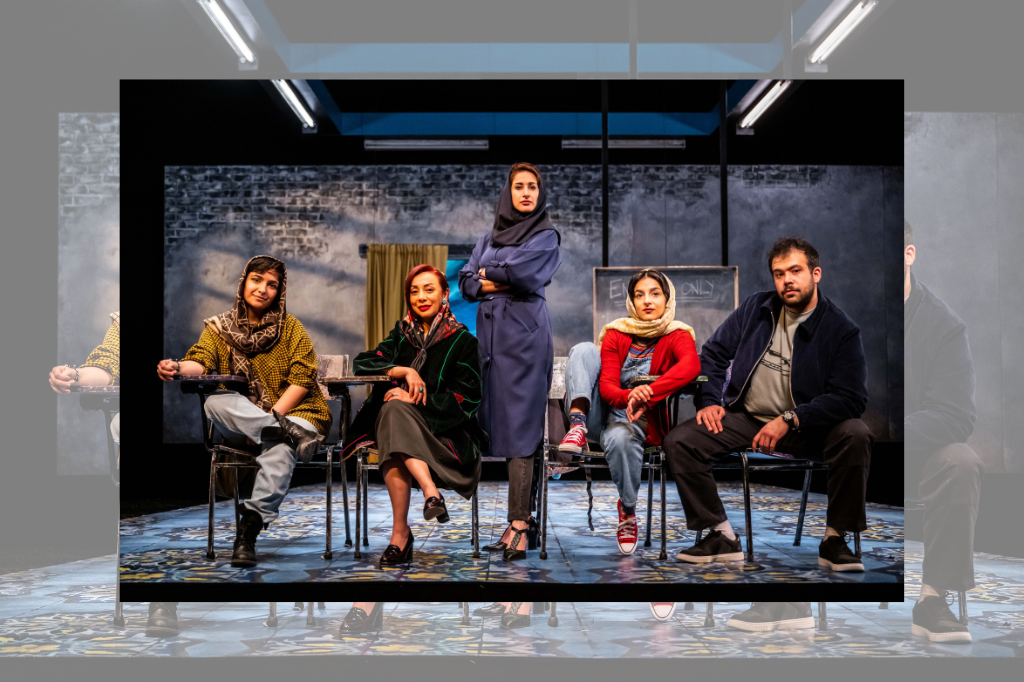REVIEW: English at Soulpepper/Segal Centre for Performing Arts
By what measure do you know when you’ve mastered a foreign language?
When the Duolingo owl nests in your progress with gerunds? When rom-com gags complete their metamorphosis from foreign, to funny, to maddeningly derivative? When the musical interludes of your language podcast become too gratingly cheerful to bear?
Learning English — well enough to pass the TOEFL (Test of English As a Foreign Language), at least — can be draining, and the fear around what happens if the test doesn’t go well can metastasize into a tremendous amount of anxiety, stress, even existential dread. For many, the stakes are higher than a score or a badge.
English at Soulpepper captures this doubt and despair of language-learning, but what makes Anahita Dehbonehie and Guillermo Verdecchia’s production of Sanaz Toossi’s smouldering play special is how much more it is than a language lesson or lecture. English doesn’t sag under the weight of its own importance, nor is there a single false note onstage. Expertly avoiding melodrama, English presents the confluence of five richly developed lives all faced with a Herculean challenge — to master (and maintain) the English language.
We meet our English class in a storefront school on the streets of Karaj, which we can just glimpse through a digital “window” in the otherwise spare classroom (a nice touch from Dehbonehie, who doubles as set designer). Our teacher, Marjan (a superb Ghazal Partou), is stylish and persistently kind, an adult English instructor with the patience and sparkle of an elementary school aide.
Marjan’s students run the gamut of language learners. There’s sweet Goli, the eighteen-year-old eager to take on the world just beyond Iran’s borders (an endearing Aylin Oyan Salahshoor); Roya, a grandmother guaranteed status in Canadian but stuck learning English at the demands of her family (in a heartbreaking performance by Banafsheh Taherian); Omid, a quiet young man whose English seems far too advanced to find a course on basic vocabulary and syntax useful (a subtle Sepehr Reybod); and Elham, a future doctor who, from her first moment onstage, establishes herself as a rebel to the English language (a nuanced, powerful Ghazal Azarbad).
As TOEFL season approaches, the learning gets stickier. In one effective, difficult sequence, Marjan runs a session on accents — Elham’s is “a war crime,” in her own words — and how to lose the thick Iranian slant when speaking English. It soon becomes clear, though, that since returning to Iran after an extended period of time living in England, Marjan’s English has deteriorated, and her accent has become more difficult to shake. For Elham, whose accent is thickest of all, this is proof enough that these lessons have been pointless and unnecessarily harsh. But for Marjan, this scene encompasses the loss of her cosmopolitan, bilingual identity — the most treasured of her many selves.
English, not unlike Paula Vogel’s Indecent, uses accent and fluency to indicate what language is being spoken onstage — when Elham’s words pour from her, all poetry and indignation, it’s clear she’s speaking Farsi, especially compared to the belaboured trudge of her broken English. At the top and tail of the show, too, we hear unsubtitled, untranslated Farsi — but the meaning both times is crystal clear. Verdecchia and Dehbonehie have coaxed winning, complex performances from their knockout cast, and it’s perhaps through these varying shades of accent (coached by Diane Pitblado) we best get to know these people and their stories.
Niloufar Ziaee’s costumes, too, carry much of the weight of English’s storytelling — Goli’s denim overalls, Marjan’s tailored dress coat, and Elham’s combat boots add readable layers of personality to the women wearing them. The women’s hijabs, too, speak volumes in a post-2008 Iran. Elham’s, in particular, always seems in danger of falling off her head — it’s perhaps the loudest of her many acts of rebellion in the play.
English is a damn good play, and Soulpepper’s is a top-notch production, with sensible pacing, eye-catching design, and haunting performances to boot. This is no trauma porn — “writing a trauma play makes me want to dry heave,” Toossi told the New York Times last year — but the stakes are effortlessly high, and the humour surprisingly organic. Learning English is no easy task. But oh, what a pleasure it is to watch that process in action at Soulpepper.
English runs at Soulpepper through March 5, 2023. Tickets are available here.















Comments